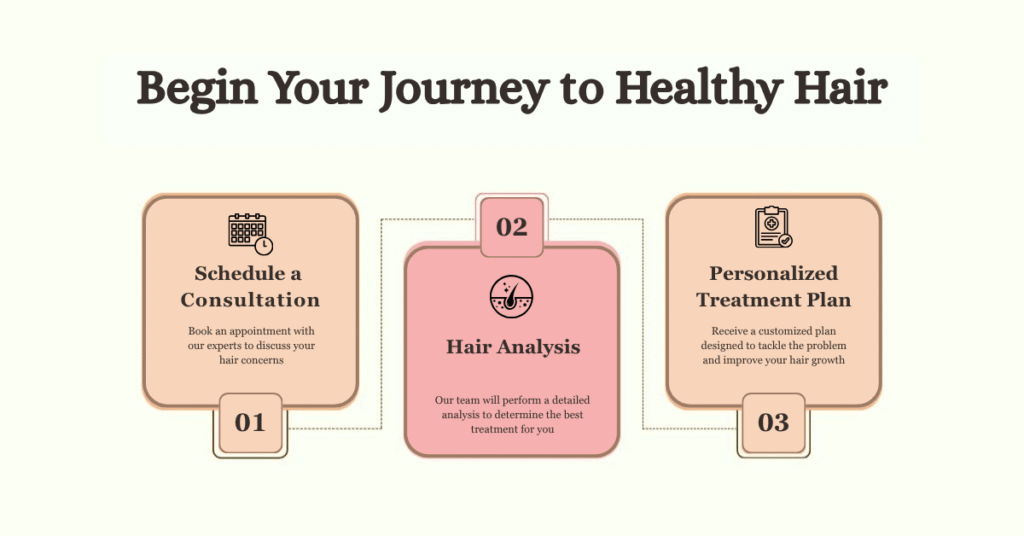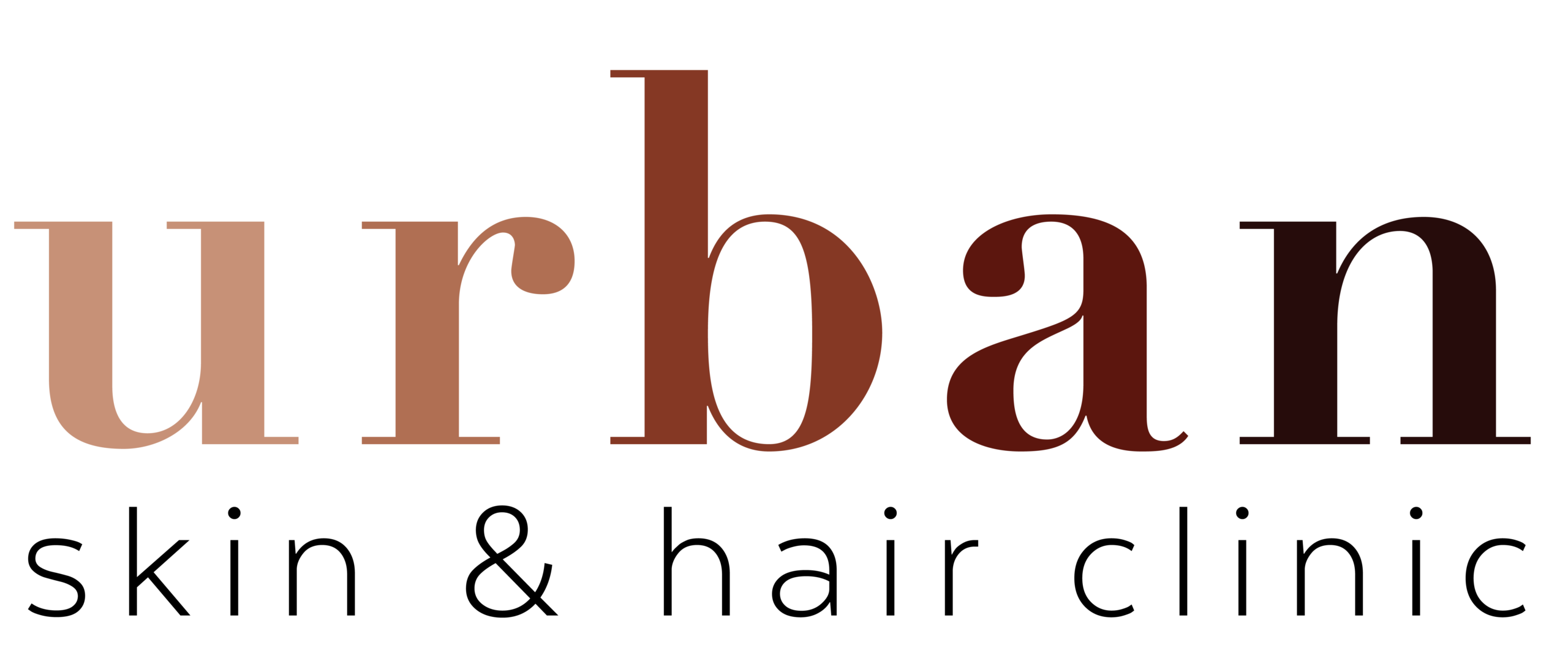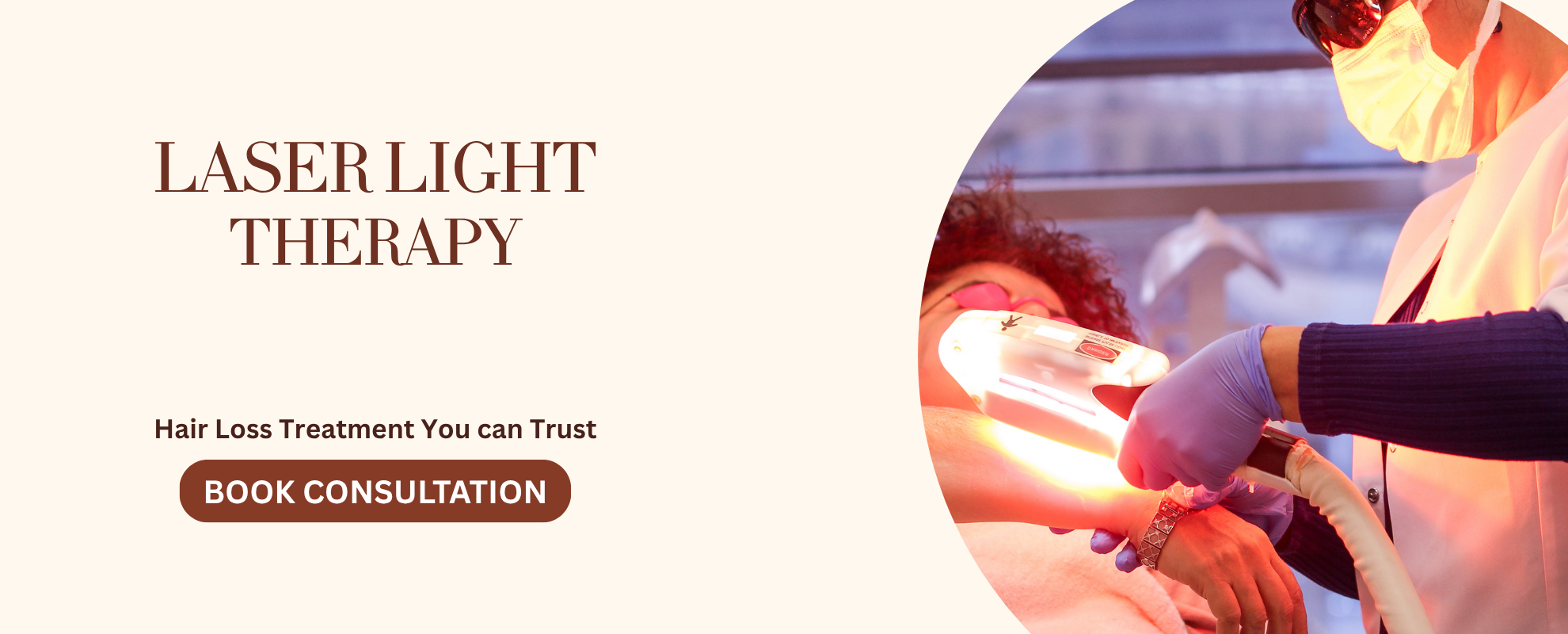
Thick, Strong & Naturally Healthy Hair with Laser Light Therapy
GFC (Growth Factor Concentrate) Therapy is one of the most advanced and result-oriented treatments for controlling hair fall and boosting natural hair regrowth. At Urban Skin and Hair Clinic, our GFC treatment uses highly concentrated growth factors derived from your own blood to repair damaged follicles, strengthen weak roots, and stimulate new hair growth. This painless, natural, and minimally invasive procedure helps reduce excessive shedding, increase hair density, and improve scalp health without any risk of allergies. With expert dermatologists and personalised GFC protocols, we ensure faster results, stronger hair regrowth, and long-lasting improvement for men and women struggling with hair loss.
What is Laser Light Therapy?
Laser Light Therapy is an innovative and non-invasive treatment option for people suffering from hair loss. At Urban Skin and Hair Clinic, we use cutting-edge low-level laser therapy (LLLT) to stimulate hair follicles, increase blood circulation to the scalp, and promote hair regrowth. This treatment is suitable for both men and women dealing with various forms of hair loss, including male and female pattern baldness.
Laser Light Therapy, also known as Low-Level Laser Therapy (LLLT), uses specific wavelengths of light to target hair follicles and promote hair growth. It is a safe, FDA-approved treatment that helps increase the production of cellular energy, stimulates blood flow to the scalp, and enhances the overall health of hair follicles. LLLT is commonly used for individuals with thinning hair or early-stage hair loss, and it can be used as a stand-alone treatment or combined with other hair restoration techniques.
What Hair Conditions Can Laser Light Therapy Treat?
Laser Light Therapy is a non-invasive, pain-free treatment that uses low-level laser light to stimulate hair follicles, enhance blood circulation, and promote hair growth. It is effective for addressing the following hair and scalp issues:
Androgenetic Alopecia (Male & Female Pattern Hair Loss)
Slows down hair thinning and promotes thicker, healthier hair growth.Chronic Hair Fall / Excessive Shedding
Strengthens weak follicles to reduce ongoing hair loss and shedding.Thinning Hair & Reduced Density
Increases hair volume, density, and strand strength for fuller hair.Weak or Damaged Hair Follicles
Revitalizes and repairs follicles to reactivate dormant hair growth.Post-COVID or Stress-Related Hair Fall
Accelerates hair regrowth and helps restore the normal hair growth cycle.Early-Stage Balding Areas
Helps slow hair loss progression and encourages new hair growth in affected zones.Poor Scalp Health
Improves blood circulation and nourishment to create a healthier scalp environment.
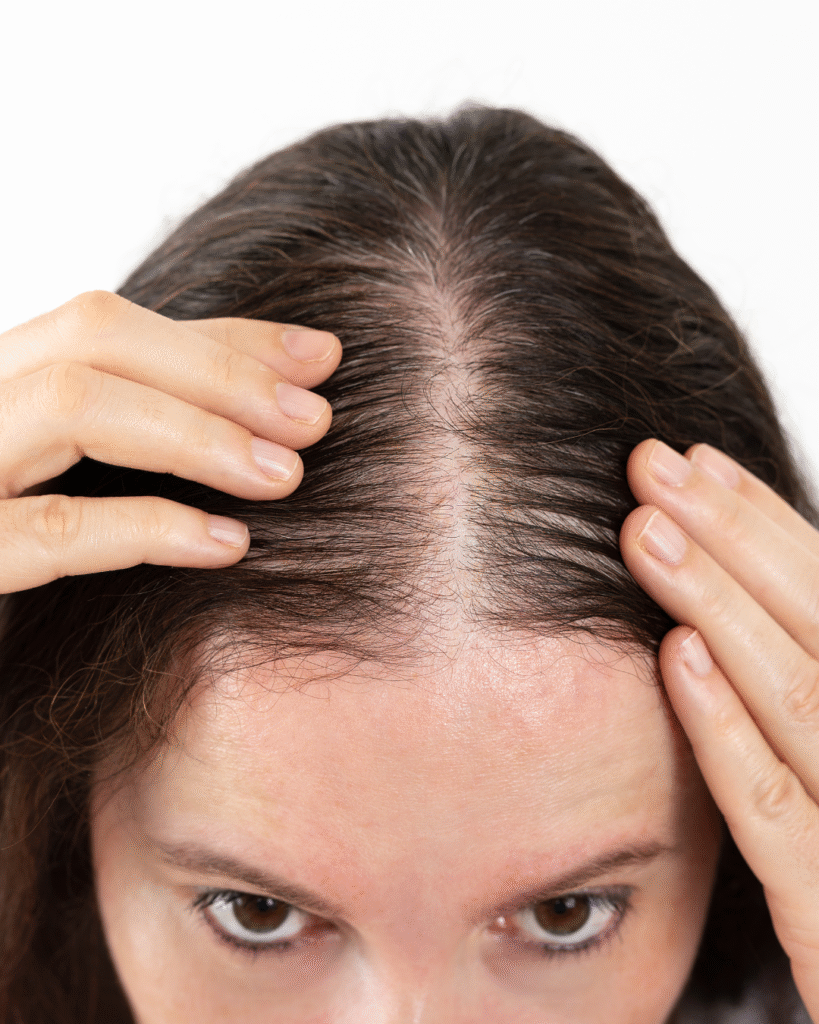
Before & After Results







Benefits of Laser Light Treatment
Laser Light Treatment is a safe, painless method that stimulates hair follicles and improves scalp health to promote natural hair growth and reduce hair loss.
- Non-invasive and pain-free procedure
- Stimulates blood circulation in the scalp
- Strengthens and revitalizes hair follicles
- Reduces hair thinning and shedding
- Promotes thicker and healthier hair growth
- Suitable for all hair types
- Enhances hair density and volume
- Helps in early-stage hair loss treatment
- Improves scalp nourishment and health
- Accelerates recovery from stress-related hair fall
Laser Light Treatment Procedure:
Step 1: Initial Consultation
Dermatologist assesses scalp condition and hair loss pattern.Step 2: Scalp Preparation
Cleanses scalp to remove oil and debris for optimal penetration.Step 3: Device Positioning
Places laser helmet or comb evenly over the treatment area.Step 4: Laser Application
Delivers low-level light therapy for 15-30 minutes per session.Step 5: Post-Treatment Care
Applies soothing serum and advises on home maintenance.Step 6: Follow-Up Sessions
Schedules 2-3 weekly treatments for 3-6 months for results.
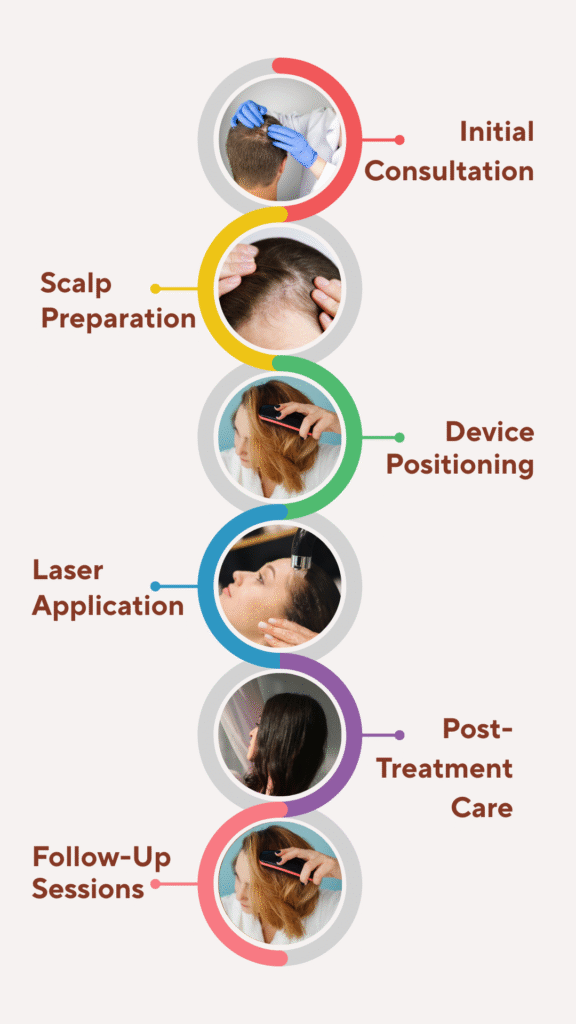
Pre and Post Treatment Care
Pre-Treatment Care
- Avoid blood-thinning medications like aspirin for 3–5 days (only if your doctor approves).
- Do not drink alcohol or smoke for at least 24 hours before the session.
- Stay well-hydrated, drink plenty of water.
- Eat a healthy meal before coming to avoid dizziness.
- Avoid applying hair oils, sprays, or styling products on the day of treatment.
Post-Treatment Care
- Do not wash your hair for 24 hours after the procedure.
- Avoid touching, rubbing, or massaging the treated area.
- Avoid heavy exercise, sweating, and gym workouts for 24–48 hours.
- Avoid alcohol, smoking, and blood-thinning medications for 24 hours.
- Do not apply hair oils, serums, or chemical treatments for at least 2–3 days.
How Treatment Cost Is Decided?
The cost of any treatment depends on several key factors that determine the type, intensity, and number of procedures required. Since every patient’s condition, goals, and expectations are different, the final pricing is customised to ensure safe, effective, and personalised care.
- Severity of the Condition
- Type of Treatment Recommended
- Number of Sessions Required
- Technology & Equipment Used
- Doctor’s Expertise & Clinic Standard
- Customisation of the Treatment Plan
- Area/Extent of Treatment
Get An Appointment

Why Urban Skin and Hair Clinic

TEAM OF CERTIFIED DERMATOLOGISTS

US-FDA APPROVED EQUIPMENTS

HIGHLY STANDARDISED PROTOCOLS

1 LAKH + HAPPY CLIENTS
FAQ for Laser Light therapy
Most patients start noticing improvements in hair texture and density after 8-12 weeks of regular treatments. Full results may take up to 6 months.
Yes, LLLT is FDA-approved and considered very safe. It uses low-level lasers that do not burn or harm the skin.
For optimal results, we recommend weekly sessions initially, followed by bi-weekly or monthly sessions once you start seeing improvements.
Yes, LLLT is effective for treating male pattern baldness by stimulating hair follicles and promoting regrowth in thinning areas.
Yes, combining LLLT with other treatments like PRP or Microneedling can enhance your results, and our experts will design a personalized treatment plan for you.
Consult a Specialist Today
Dr. Kiran Chotaliya, M.D. Dermatology & Hair Transplant Surgeon, brings years of experience and cutting-edge techniques to GFC therapy. His in-depth understanding of hair restoration allows him to create customized treatment plans that deliver outstanding results for his patients.
What is Laser Light Therapy?
Non-Invasive Hair and Skin Treatment: Laser Light Therapy uses low-level laser energy to stimulate hair follicles and rejuvenate the skin, promoting natural growth and repair without surgery.
Stimulates Hair Follicles: For hair loss, it improves blood circulation to the scalp, strengthens roots, and encourages thicker, healthier hair growth.
Repairs and Revitalizes Skin: When used for skin, it helps reduce acne, scars, pigmentation, and signs of aging by boosting collagen production.
Safe and Painless Procedure: It’s a gentle, FDA-approved treatment with no downtime, suitable for both men and women.
Visible and Long-Lasting Results: With regular sessions at Urban Skin and Hair Clinic, patients notice improved hair density, radiant skin, and enhanced overall texture and health.
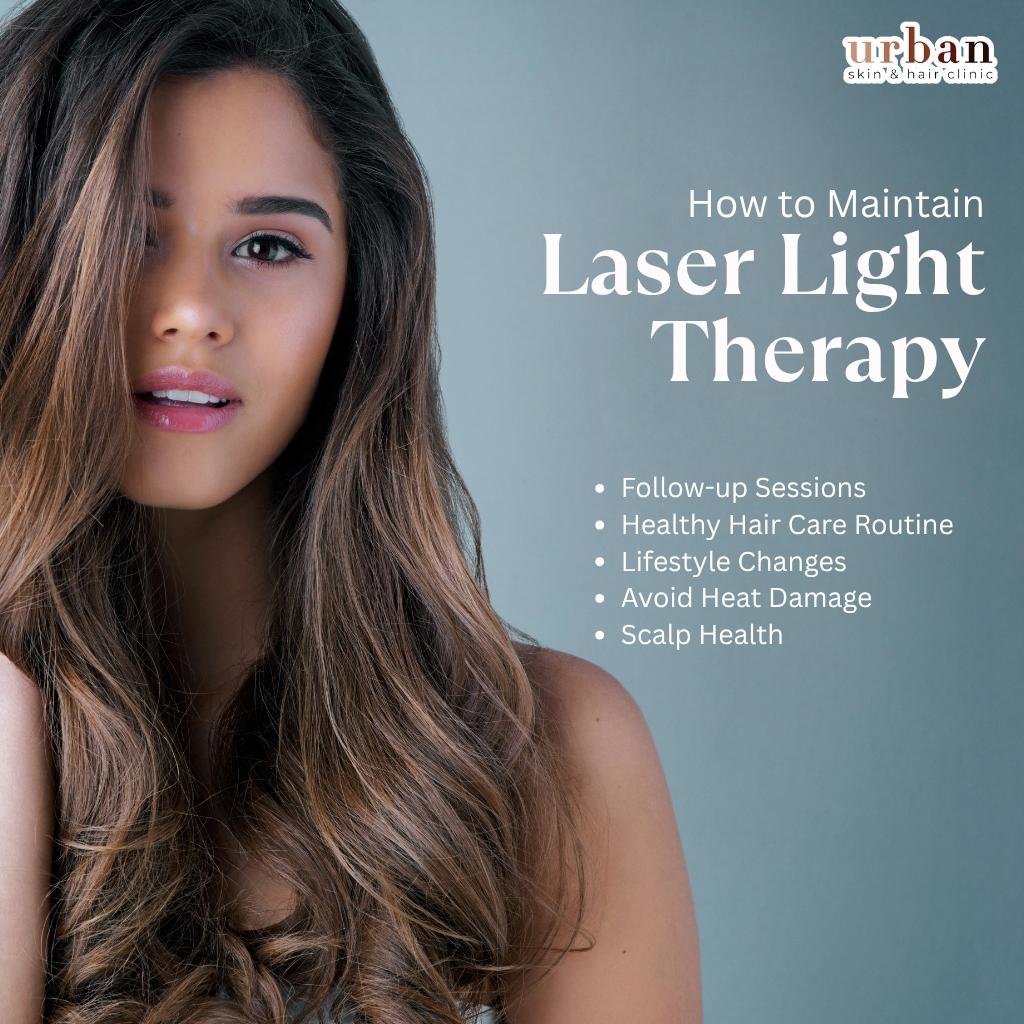
What Causes Laser Light Therapy in Hair Loss?
Laser Light Therapy helps treat (not cause) hair loss by stimulating weak hair follicles and improving blood circulation in the scalp. It boosts oxygen and nutrient supply, strengthens roots, and extends the hair growth phase. This non-invasive treatment rejuvenates dormant follicles, reducing hair fall and promoting natural, healthy regrowth over time.
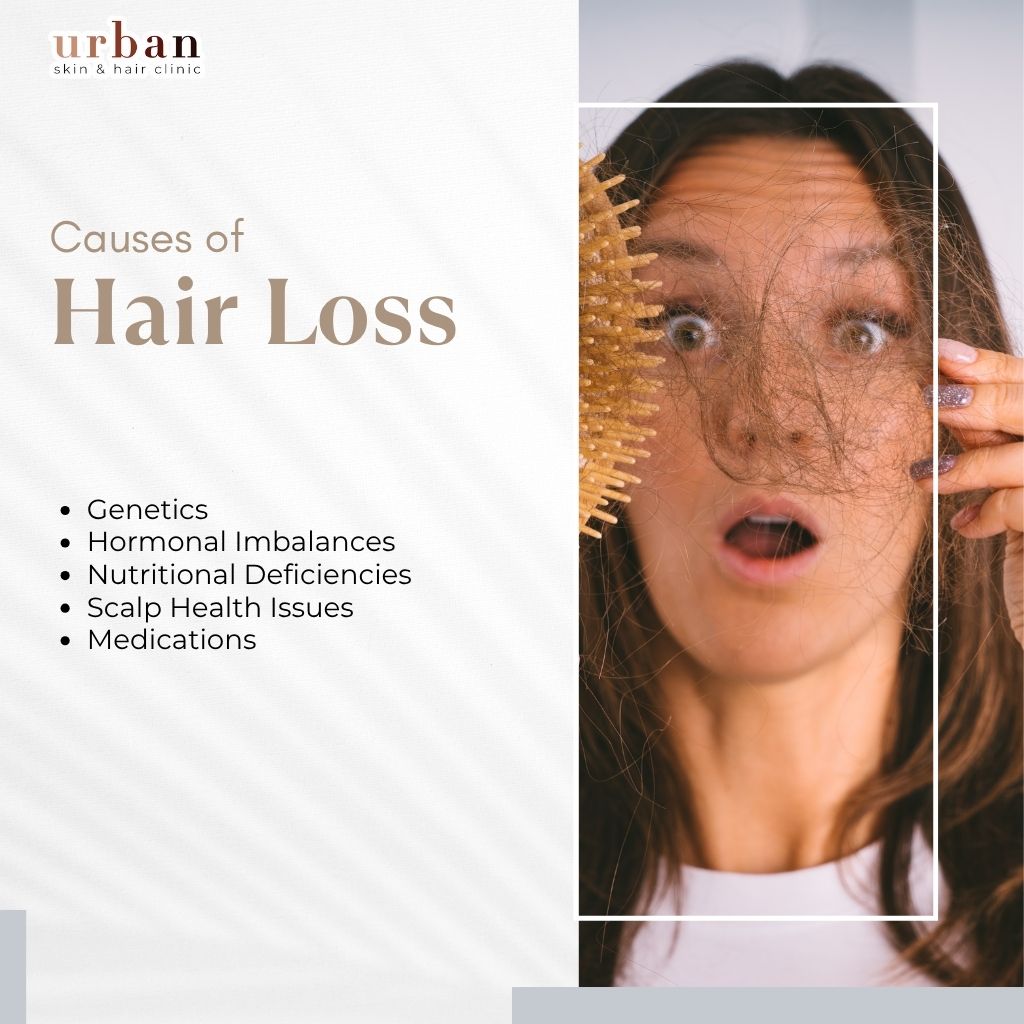
Causes of Hair Loss
Hair loss can occur due to a variety of reasons, including:
- Genetics: The most common cause of hair loss, affecting both men and women.
- Hormonal Imbalances: Conditions like PCOS, pregnancy, and menopause can lead to hair thinning or shedding.
- Nutritional Deficiencies: Lack of essential vitamins and minerals can weaken hair follicles and cause hair loss.
- Stress: Chronic stress can disrupt hair growth cycles and lead to shedding.
- Scalp Health Issues: Conditions such as dandruff, fungal infections, or scalp psoriasis can contribute to hair loss.
- Medications: Certain medications, including chemotherapy and those for thyroid disorders, can lead to hair thinning.
- Aging: As we age, hair naturally thins due to a decrease in hair follicle activity.
Treatment Benefits
✅ Promotes Hair Regrowth: Stimulates dormant hair follicles to begin producing new hair.
✅ Non-Invasive and Pain-Free: No needles, no surgery, and no downtime – just sit back and relax while the therapy works.
✅ Improves Scalp Health: Enhances blood circulation, oxygen supply, and nutrient absorption, promoting a healthier scalp environment for hair growth.
✅ Boosts Hair Density: Helps thicken and strengthen existing hair, making it appear fuller and healthier.
✅ Prevents Further Hair Loss: By stimulating the scalp, laser therapy can help slow or stop hair loss progression.
✅ Safe for All Hair Types: Effective for both men and women, and works on various hair types and colors.
✅ Quick and Convenient Sessions: Sessions typically last 20-30 minutes and can easily fit into a busy schedule.
Before-After Results
Laser Light Therapy shows noticeable results after a few sessions, with most clients experiencing thicker, fuller hair within 8-12 weeks. The first signs of improvement are often reduced shedding and hair thinning, followed by visible hair regrowth. With continued treatments, clients can achieve more substantial and long-lasting results.

How to Maintain the Results of Laser Light Therapy
- Follow-up Sessions: Regular treatments are required to maintain results. We recommend sessions once a week initially, then tapering to bi-weekly or monthly as you see progress.
- Healthy Hair Care Routine: Use gentle, nourishing shampoos and conditioners to keep your hair and scalp healthy.
- Lifestyle Changes: Maintain a balanced diet, manage stress, and get enough sleep to support hair health.
- Avoid Heat Damage: Excessive use of heat styling tools can cause breakage and slow down the progress of hair regrowth.
- Scalp Health: Keep your scalp free from dandruff and other conditions by following proper scalp care practices.
Benefits of Laser Light Therapy at Urban Skin and Hair Clinic
Experience the transformative benefits of expert acne treatment at Urban Skin and Hair Clinic:
Stimulates Natural Hair Growth PRP uses your own platelets to activate dormant follicles, promoting natural, healthy, and thicker hair growth.
Reduces Hair Fall Effectively Strengthens weak hair roots, minimizes hair thinning, and improves scalp health to control hair loss.
Safe and Non-Surgical Procedure 100% natural treatment with no chemicals or side effects, performed under expert dermatologist supervision.
Improves Hair Density and Texture Enhances hair volume, strength, and shine by improving blood circulation and collagen production.
Long-Lasting and Visible Results With regular sessions, PRP delivers lasting improvements in hair thickness and overall scalp vitality.
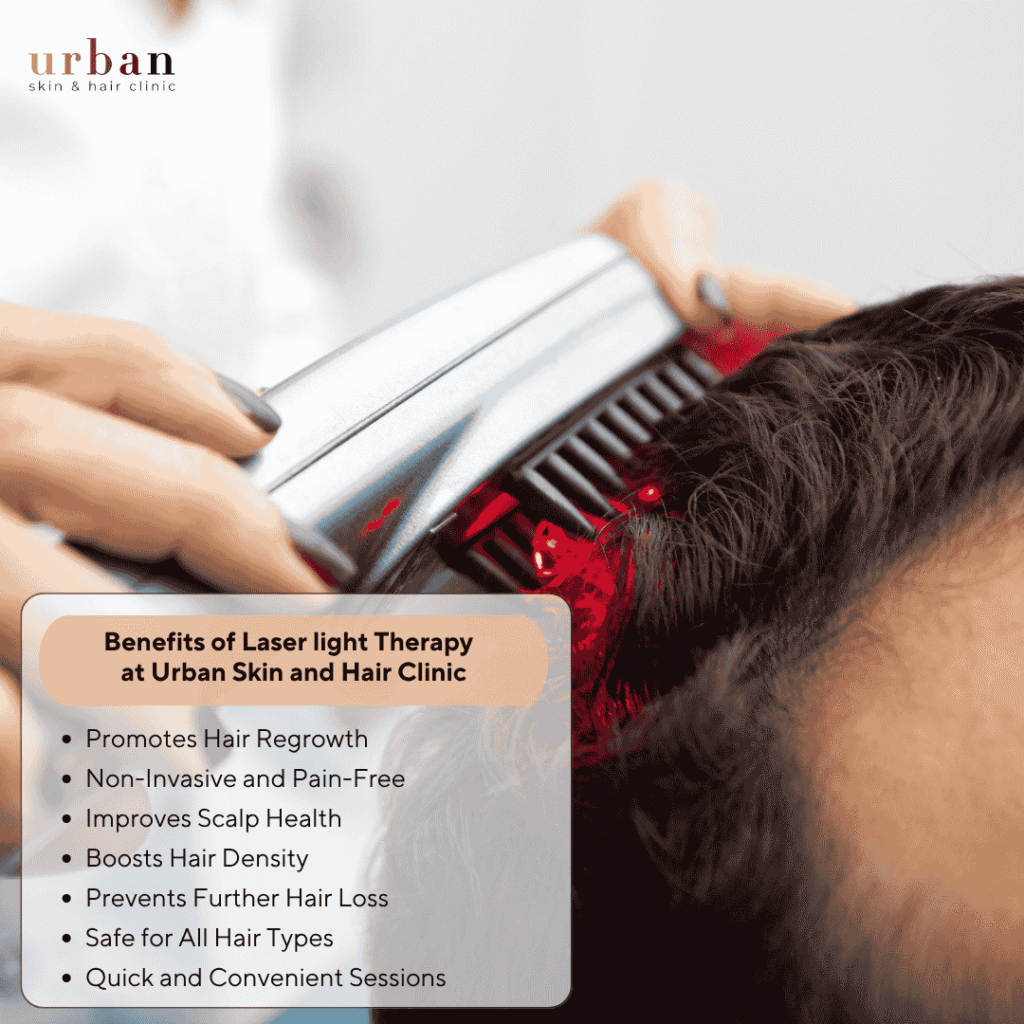
How to prevent Hair Damage forever?
Preventing hair damage forever requires proper care, a balanced diet, and protection from heat and chemicals. Regular nourishment, gentle handling, and healthy lifestyle habits help maintain hair strength and shine. At Urban Skin and Hair Clinic, experts recommend customized treatments and care routines to restore damaged hair and prevent future breakage, dryness, and split ends.
Limit the use of hair dryers, straighteners, and curlers. Excess heat weakens the hair shaft, leading to dryness and breakage. Always use a heat protectant spray before styling.
Choose sulfate-free shampoos and nourishing conditioners that maintain moisture balance. Avoid harsh chemicals, frequent coloring, or strong hair treatments that strip natural oils.
Eat foods rich in protein, iron, and omega-3 fatty acids. Nutrients like biotin and vitamin E strengthen hair roots and promote natural shine.
Wear a hat or scarf outdoors. UV rays and pollutants can damage hair cuticles, making strands dull and weak.
Trim split ends every 6–8 weeks and opt for professional hair spa or PRP treatments at Urban Skin and Hair Clinic for deep nourishment and lasting strength.
Treatment Options at Urban Skin and Hair Clinic
We offer customized treatment plans that include the use of advanced laser devices specifically designed for hair regrowth:
- Low-Level Laser Therapy (LLLT): Our FDA-approved LLLT devices deliver concentrated light to the scalp to stimulate hair follicles.
- Combination Therapy: We combine laser therapy with other treatments, like PRP or Microneedling, for enhanced results.
- Hair Care Counseling: Our dermatologists guide you on maintaining optimal scalp health and selecting the best hair care products to complement laser therapy.
- At-Home Laser Devices: For convenience, we also provide FDA-cleared at-home laser devices for maintenance between professional treatments.
Each session is tailored to your specific needs, ensuring you get the best results in the shortest time.
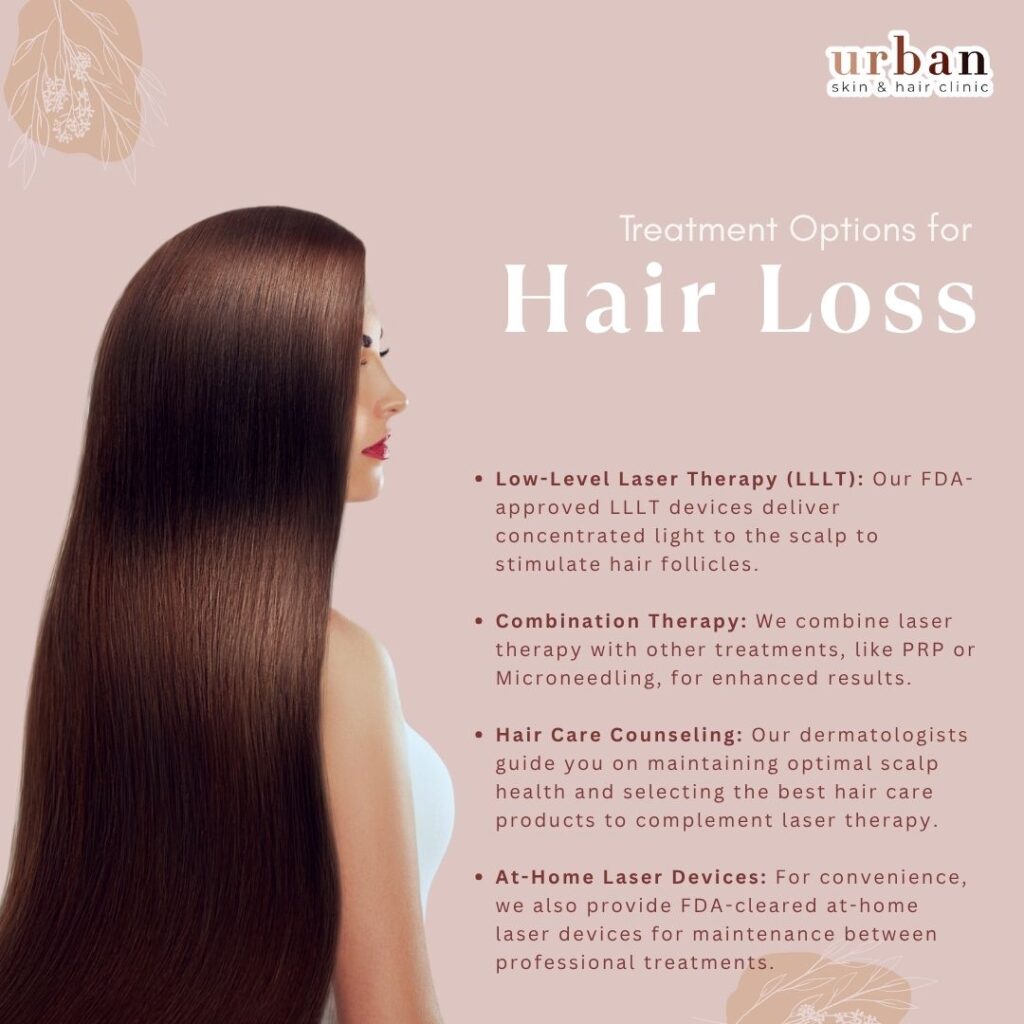

PRP + GFC Therapy
Combining growth factors for enhanced follicular activation

PRP + Microneedling
Allows deeper penetration of growth factors and boosts collagen

PRP Post Hair Transplant
Enhances graft survival, reduces inflammation, and accelerates recovery

PRP + LLLT (Laser Therapy)
Stimulates blood circulation and improves hair strength
Introduction
Laser light therapy, also known as low-level laser therapy (LLLT) or cold laser therapy, is an innovative treatment method that utilizes specific wavelengths of light to stimulate cellular activity and promote healing in various areas of the body. This non-invasive and painless procedure has gained popularity in recent years for its potential benefits in hair restoration, skin rejuvenation, pain management, and other therapeutic applications.
What is Postpartum LASER Light Therapy Treatment
Postpartum laser light therapy treatment is a specialized form of laser therapy designed to address hair loss and promote hair regrowth in women who have experienced hair thinning or shedding after childbirth. It is a non-invasive and safe procedure that utilizes low-level laser therapy (LLLT) to stimulate the hair follicles, improve scalp health, and enhance hair growth.
LASER Light Therapy Procedure?
- Research and Gather Information: Start by conducting thorough research online. Look for reputable laser light therapy centres in your area or those that offer remote consultation services. Read reviews, check their websites, and gather information about their expertise, experience, and the specific laser devices they use.
- Credentials and Expertise: Verify the credentials of the professionals providing the laser light therapy treatment. Ensure that they have the necessary qualifications, certifications, and experience in the field. Look for specialists such as dermatologists, trichologists, or professionals specifically trained in laser light therapy.
- Consultation and Assessment: Schedule consultations with potential laser light therapy centres. During these consultations, discuss your specific concerns and goals. The centre should conduct a thorough assessment of your hair and scalp condition to determine if laser light therapy is the appropriate treatment for you.
- Treatment Options and Technology: Inquire about the different laser light therapy devices and technologies used at the center. Ensure they use FDA-cleared or approved devices that are known for their safety and efficacy. Ask about the specific wavelengths and power levels used and how they customize treatment plans for individual patients.
- Experience and Track Record: Inquire about the centre’s experience and track record in providing laser light therapy treatments. Ask about their success rates, testimonials from previous clients, and before-and-after photos to gauge their level of expertise and the results they have achieved.
- Safety and Hygiene: Ensure that the laser light therapy centre follows strict safety protocols and maintains a clean and hygienic environment. Inquire about the sterilization of equipment and how they adhere to infection control measures.
- Customized Treatment Plans: Everyone’s hair loss situation is unique, so a reputable laser light therapy centre should provide personalized treatment plans tailored to your specific needs. Ask about the duration of treatment, expected results, and any follow-up appointments or maintenance required.
- Cost and Financing Options: Discuss the cost of laser light therapy treatments with the centre. Inquire about any financing options or payment plans they may offer. Remember to consider the value provided by the centre in terms of expertise, technology, and the overall quality of service.
- Client Reviews and Recommendations: Read reviews and testimonials from previous clients to get insights into their experiences with the laser light therapy centre. Consider seeking recommendations from trusted sources such as friends, family, or healthcare professionals.
- Trust Your Instincts: Ultimately, trust your instincts and choose a laser light therapy centre where you feel comfortable, well-informed, and confident in the expertise of the professionals providing the treatment.
Benefits of LASER Light Therapy Procedure?
- Hair Regrowth and Hair Restoration: Laser light therapy has shown promise in stimulating hair follicles, promoting hair regrowth, and improving hair density in individuals experiencing hair loss or thinning. It can help revitalize dormant hair follicles, strengthen existing hair strands, and potentially slow down the progression of hair loss.
- Improved Scalp Health: Laser light therapy can improve the overall health and condition of the scalp. It enhances blood circulation, increases nutrient supply to the hair follicles, and stimulates cellular activity in the scalp. This can lead to a healthier scalp environment, reduced inflammation, and improved scalp conditions such as dandruff or itchiness.
- Skin Rejuvenation and Anti-Aging: Laser light therapy can promote collagen production, which helps improve skin elasticity and firmness. It can minimize the appearance of fine lines, wrinkles, and age spots, resulting in a more youthful and rejuvenated complexion. Additionally, it can help improve skin texture, tone, and overall skin health.
- Pain Management: Laser light therapy has been found to have analgesic properties and may help reduce pain and inflammation associated with various conditions, such as arthritis, joint pain, muscle strains, and sports injuries. It can also help promote tissue healing and reduce recovery time.
- Accelerated Wound Healing: Laser light therapy can enhance the healing process of wounds, burns, and surgical incisions. It promotes tissue regeneration, improves blood flow to the affected area, and reduces inflammation. This can result in faster healing, reduced scarring, and improved overall wound recovery.
- Non-Invasive and Painless: Laser light therapy is a non-invasive and painless procedure. It does not require any incisions or anaesthesia, making it a convenient and comfortable treatment option for individuals seeking non-surgical solutions.
- No Downtime: Laser light therapy sessions typically do not require downtime or recovery periods. You can resume your regular activities immediately after the treatment, making it a convenient option for those with busy schedules.
Side effects of LASER Light Therapy Procedure?
- Mild Discomfort: Some individuals may experience mild discomfort or a slight sensation of warmth or tingling during the laser light therapy session. However, this discomfort is usually minimal and well-tolerated.
- Skin Irritation: In some cases, laser light therapy may cause temporary skin irritation, such as redness, itching, or swelling in the treated area. These symptoms typically subside within a few hours to a couple of days after the treatment.
- Eye Sensitivity: Laser light therapy devices emit light that can be harmful to the eyes if directly exposed. Therefore, it is crucial to wear protective eyewear or ensure that the eyes are adequately shielded during the procedure to avoid any potential eye damage.
- Potential for Burns: Although rare, there is a small risk of burns if the laser light therapy device is used incorrectly or if the treatment duration and intensity are not properly adjusted for individual skin types. It is essential to receive laser light therapy from trained professionals who follow safety guidelines.
- Pre-existing Conditions: Individuals with certain pre-existing conditions, such as photosensitivity disorders or skin cancers, may not be suitable candidates for laser light therapy. It is important to disclose any relevant medical history to the healthcare professional performing the procedure to ensure its safety and effectiveness.
Pre-Care for LASER Light Therapy
- Consultation: Schedule a consultation with a healthcare professional or a specialist in laser light therapy. This initial assessment allows the professional to evaluate your specific condition, discuss your expectations, and determine if you are a suitable candidate for laser light therapy.
- Medical History: Provide a comprehensive medical history to the healthcare professional, including any underlying health conditions, allergies, medications you are taking, and previous treatments or procedures you have undergone. This information will help determine the safety and suitability of laser light therapy for your specific needs.
- Avoid Sun Exposure: Minimize sun exposure to the treatment area for at least two weeks before your laser light therapy session. Sunburned or tanned skin can be more susceptible to potential side effects such as skin irritation or hyperpigmentation.
- Avoid Skin Sensitizing Products: Refrain from using any skincare products or medications that may sensitize the skin or increase its photosensitivity. This includes retinoids, exfoliating agents, chemical peels, and certain acne medications. Follow the specific instructions provided by your healthcare professional regarding the use of skincare products before the procedure.
- Shave the Treatment Area: In some cases, shaving the treatment area before the laser light therapy session may be recommended. This allows the laser to better penetrate the skin and target the intended area effectively. However, it is essential to follow the specific instructions provided by your healthcare professional regarding shaving.
- Remove Makeup and Lotions: If the laser light therapy is performed on the face or other areas with makeup or lotions, it is typically advised to remove them before the procedure. This ensures that the laser light reaches the skin directly and maximizes its effectiveness.
- Hydrate and Stay Hydrated: Adequate hydration is essential for healthy skin and overall well-being. Drink plenty of water before your laser light therapy session to keep your skin hydrated and improve its ability to absorb the laser energy.
- Follow Instructions: Your healthcare professional may provide specific pre-care instructions tailored to your individual needs. It is important to follow these instructions carefully to optimize the results of your laser light therapy and minimize any potential complications.
After Care for LASER Light Therapy
- Protect Your Skin from Sun Exposure: After laser light therapy, your skin may be more sensitive to the sun. Avoid direct sun exposure and wear protective clothing, such as hats and long sleeves, when outdoors. Apply a broad-spectrum sunscreen with an SPF of 30 or higher to the treated area whenever you go outside, even on cloudy days.
- Avoid Hot Showers and Baths: For the first 24 to 48 hours after the procedure, avoid hot showers, baths, or steamy environments. Hot water can irritate the treated skin and potentially increase the risk of complications.
- Gentle Cleansing: Cleanse the treated area gently with a mild, non-irritating cleanser recommended by your healthcare professional. Avoid using harsh or abrasive cleansers, as they can irritate the skin. Pat the skin dry with a soft towel, avoiding rubbing or scrubbing.
- Moisturize Regularly: Keep your skin moisturized after laser light therapy to maintain hydration and promote healing. Use a gentle, non-comedogenic moisturizer that is suitable for your skin type. Apply it to the treated area as directed by your healthcare professional.
- Avoid Irritating Products: Refrain from using skincare products that contain harsh ingredients, fragrances, or exfoliants on the treated area for at least a week after the procedure. These products can irritate the skin and interfere with the healing process.
- Avoid Makeup and Hair Removal: Avoid applying makeup to the treated area for at least 24 to 48 hours to allow the skin to recover. Additionally, refrain from any hair removal methods, such as waxing or tweezing, on the treated area until your healthcare professional gives you the go-ahead.
- Protect the Skin: Be cautious when engaging in activities that may potentially irritate or harm the treated skin. Avoid rubbing, scratching, or picking at the treated area to prevent complications and ensure optimal healing.
- Follow Post-Treatment Instructions: Your healthcare professional may provide specific post-treatment instructions based on your individual needs. It is crucial to follow these instructions carefully to optimize the healing process and achieve the desired results.
- Follow-Up Appointments: Attend any scheduled follow-up appointments with your healthcare professional to monitor your progress and address any concerns or questions you may have.
